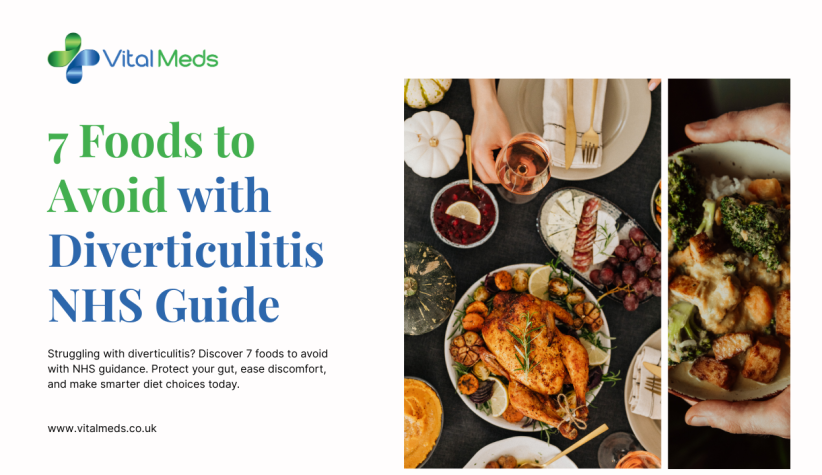- Your cart is empty
- Continue Shopping
7 Foods to Avoid with Diverticulitis NHS Guide

7 Foods to Avoid with Diverticulitis NHS can be confusing to understand, and living with diverticulitis often feels overwhelming. According to NHS guidelines, diet is important in managing this condition. We’ll discuss the 7 foods you should avoid with diverticulitis in this article. We’ll explain why these foods can worsen symptoms and provide safe alternatives. We will also discuss treatment options and medications that can help support recovery.
What Is Diverticulitis?
Diverticulitis occurs when small bumps (diverticula), which form on the lining the large intestine, become inflamed and infected. Symptoms include:
- Abdominal pain usually on the left side
- Bloating
- Constipation and diarrhoea
- Fever or nausea
Diverticulitis can cause severe pain and requires medical attention. The NHS stresses the importance of lifestyle and dietary modifications in reducing the likelihood of recurrent episodes.
Why Does Diet Matter in Diverticulitis?
Diverticula can be irritated by food as it passes through the digestive system. Some foods can be difficult to digest, and this may lead to increased pressure in the intestines. NHS advice suggests avoiding specific foods during flare-ups and gradually reintroducing high-fibre food once the condition settles.
7 Foods to Avoid with Diverticulitis (NHS Advice)
Understanding the 7 Foods to Avoid with Diverticulitis NHS can make living with this condition easier and less stressful. Some foods may trigger painful flare-ups, bloating, or discomfort, so knowing what to skip is essential. Below we cover the key foods to avoid and safer alternatives for better gut health.
1. Nuts and Seeds
Nuts and seeds contain fibre and healthy fats. However, their hard, small particles can lodge in diverticula. This can cause irritation of the colon lining and lead to infection or pain. Popcorn kernels, sesame seeds and chia seeds are especially problematic because they do not break down quickly.
Better option: You can choose smooth nut butters or jams without seeds, which will give you all the nutrition and none of the irritation.
2. Corn and Popcorn
The body has a difficult time digesting corn and popcorn. They can be trapped in diverticula because their tough outer shells are able to pass through the digestive tract intact. Popcorn, in particular, can scratch the intestinal wall and worsen abdominal pain and bloating.
Better option: Replace hard vegetables with soft ones, such as steamed sweet potatoes or courgettes.
3. Red and Processed Meats
The gut is inflamed when red meats, such as pork, beef, and lamb, or processed meats, like bacon, salami, and sausages are consumed. They are also difficult to digest, and high in fat. This can lead to constipation. Regular consumption of these meats may lead to a greater frequency of diverticulitis attacks.
Better option: Choose lean proteins like chicken, turkey or fish. You can also opt for plant-based options such as lentils and beans, but only after flare-ups are gone.
4. Refined Grains
Refined grains such as white bread, rice, and pasta are devoid of fibre. This makes it harder to pass stools. It can cause diverticulitis and increase pressure in the colon. These versions are also deficient in essential nutrients when compared with wholegrain varieties.
Better option: After recovering from an outbreak, you can reintroduce grains such as brown or quinoa rice, wholemeal bread, oats and oat bran to encourage regular bowel movements.
5. Dairy Products
Diverticulitis does not affect everyone, but dairy products such as full-fat cream, cheese, and milk can aggravate symptoms like bloating, diarrhoea, and gas. Lactose intolerant people often find dairy aggravates their digestive problems.
Better option: Choose lactose free dairy products, or alternative plant-based milks such as almond, soya, or oat. Greek yoghurt can support gut health.
6. Fried and Fatty Foods
The digestive system is put under extra stress by greasy foods such as fried chicken, chips and fast food hamburgers. These foods can cause bloating and diarrhoea during an attack. Inflammation is also triggered by high-fat foods, which makes flare-ups worse.
Better option: You can also choose to cook with less oil by using steaming, grilling, baking or air-frying.
7. Spicy Foods
Spices such as chilli peppers or curry spices can cause irritation to the lining of your intestines. Diverticulitis can cause diarrhoea or cramps in some people.
Better option: Improve flavour by adding non-irritating spices and herbs such as oregano oregano ginger or parsley.
NHS Advice for Diverticulitis Diet Management
The NHS advises:
- During flare ups, stick to a liquid or low-fibre diet to reduce bowel inflammation.
- After recovering: Reintroduce slowly a diet high in fibre (fruits and vegetables, wholegrains), to promote healthy digestion.
- Constipation can be prevented by staying hydrated. Drink 6-8 glasses water per day.
- Regular eating is important for gut health.
Medicines for Diverticulitis
In addition to dietary changes, medications may be prescribed depending on your symptoms.
- Paracetamol can be used to relieve pain. Ibuprofen and other NSAIDs should only be taken under prescription. They can cause stomach irritation.
- Antibiotics are prescribed by doctors in moderate to severe infections.
- Mebeverine, for example, can help relieve abdominal cramps.
- Fibre Supplements: Once recovered, bulk-forming laxatives (like ispaghula husk) may help prevent constipation.
Vital Meds Pharmacy allows you to order prescriptions from the NHS and access them online. This makes treatment easier.
Lifestyle Tips for Managing Diverticulitis
- Regular exercise is essential to maintaining bowel movements.
- Quit smoking as it worsens digestive issues.
- Alcohol can cause stomach irritation.
- Yoga, meditation or deep breathing can help you manage stress.
When to See a Doctor
If you suffer from:
- Abdominal pain that is severe
- Blood in the stool
- High fever
- Persistent vomiting
These symptoms may be indicative of a serious infection or complication requiring hospital treatment.
Managing Diverticulitis with Smart Food Choices
Diverticulitis can be managed by a combination of lifestyle changes, medical treatment and dietary adjustments. You can support your digestive system by avoiding foods which trigger symptoms, and following NHS diet advice. Consult your GP for additional support and look into medicines from trusted providers such as VitalMeds Pharmacy.
FAQs on Diverticulitis Diet and NHS Advice
Once your flare-up has settled, you can reintroduce nuts gradually. Start with small quantities and watch your symptoms. When you have flare-ups stick with seedless and smooth alternatives.
A high-fibre, long-term diet is beneficial for bowel health. However, it should not be continued until after the flare-up has subsided. During flare-ups, low-fibre meals reduce irritation. Follow your doctor’s instructions when reintroducing fiber.
Paracetamol has been found to be the most effective way of managing diverticulitis pain. NSAIDs such as ibuprofen should only be taken if prescribed by your doctor. They can irritate your stomach. Before starting any medication, consult your doctor.
Diverticulitis is not curable, but the symptoms can be effectively managed. Many people can live without flare-ups by making lifestyle changes, adjusting their diet, or taking medications. Regular GP visits can help reduce the risk.
VitalMeds offers convenient online ordering of medicines and NHS prescription services. Our supplements and pain relievers support digestive health. Our pharmacists can guide you to the best treatment options.

